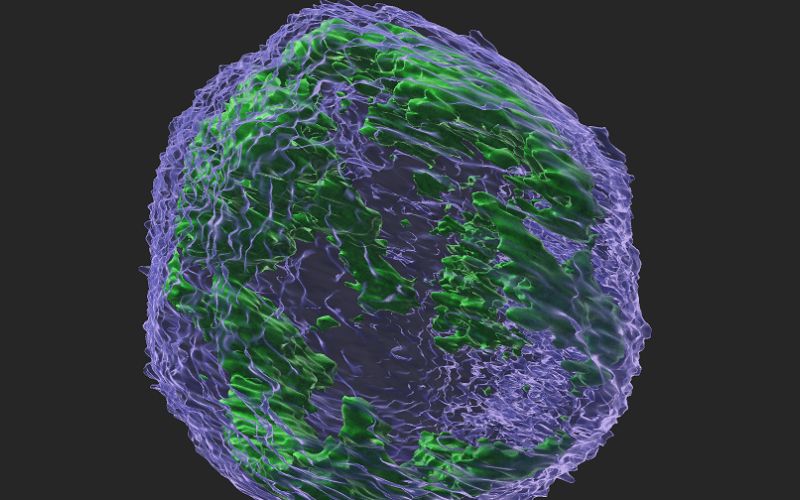Bishoy M. Faltas, MD, a medical oncologist at NewYork-Presbyterian/Weill Cornell Medicine and Director of Bladder Cancer Research at the Englander Institute for Precision Medicine at Weill Cornell Medicine, was awarded a MERIT grant from the National Cancer Institute at the National Institutes of Health to advance his research into the role of APOBEC3 enzymes in metastatic bladder cancer. The MERIT (Method to Extend Research in Time) award provides investigators with ambitious scientific projects with up to seven years of federal grant support.
At NewYork-Presbyterian/Weill Cornell Medicine, Dr. Faltas and his team employ a broad range of experimental models of urothelial bladder cancers to understand how cancer cells use APOBEC3 enzymes to develop drug resistance. He hopes to translate these discoveries into novel therapies that extend the lives of patients with bladder cancer, a disease with no uniformly curative therapies.
“The MERIT award gives us the stability and the ability to pursue more research directions concerning APOBEC3 enzymes and their role in driving mutations that lead to drug resistance in bladder cancer, which is a major problem for patients,” says Dr. Faltas. “Our goal is to stem or prevent the evolution of treatment resistance, which would be a sea change in how we can keep bladder cancer patients alive and well for much longer.”
Our goal is to stem or prevent the evolution of treatment resistance, which would be a sea change in how we can keep bladder cancer patients alive and well for much longer.
— Dr. Bishoy M. Faltas

A representative image from a 3D reconstruction of an extracted nucleus scanned by confocal laser scanning microscopy. The violet surface indicates the nuclear surface reconstructed from the DAPI staining. The green signal indicates the GFP signal of an APOBEC3 protein within the reconstructed DAPI surface.
Over the past decade, promising new drugs have transformed the treatment landscape for bladder cancer, the sixth most common form of cancer in the United States. “These past 10 years have been exciting times where we have seen the introduction of immunotherapy and targeted therapies as treatments for bladder cancer,” says Dr. Faltas. “However, most patients with metastatic bladder cancer eventually develop resistance to one or more of these therapies.”
“At the present time, there is no class of drugs that prevents resistance to therapy, and there is no known mechanism to target the evolutionary driver of resistance,” continues Dr. Faltas. “This almost inevitable evolution of resistance is what we are trying to address in our research, and the reason why I got into this field. By understanding these processes, we hope to dismantle the very mechanisms that allow bladder cancer cells to sidestep our treatments.”
At the present time, there is no class of drugs that prevents resistance to therapy, and there is no known mechanism to target the evolutionary driver of resistance. This inevitable evolution of resistance is what we are trying to address in our research, and the reason why I got into this field.
— Dr. Bishoy M. Faltas
One compelling process potentially driving treatment resistance is the mutagenic property of APOBEC3 enzymes, proteins manufactured in human cells that defend against viruses and cause mutations in cancer cells. In a 2016 study of human bladder tumor samples, Dr. Faltas and his team found a high proportion of the mutations in these tumors were related to APOBEC3 enzymes, and these mutations appeared to play a role in helping tumors elude the effects of chemotherapy. One potential way to explain this observed increase in mutagenesis is that chemotherapy drugs create breaks in double-stranded DNA and expose single strands of DNA during the repair process. These exposed strands are bound and mutated by the APOBEC3 enzymes in bladder cancer cells.
“APOBEC3 is an evolutionary driver estimated to be responsible for more than half of all mutations in a given bladder cancer,” says Dr. Faltas. “Our team is investigating methods to inhibit the DNA repair pathways that cancer cells rely on to repair the DNA breaks caused by the APOBEC3 enzymes. The goal is to turn the cancer cells’ very survival mechanism into an Achilles heel, or a fatal flaw.”
Our team is investigating methods to inhibit the DNA repair pathways that cancer cells rely on to repair the DNA breaks caused by the APOBEC3 enzymes. The goal is to turn the cancer cells’ very survival mechanism into an Achilles heel, or a fatal flaw.
— Dr. Bishoy M. Faltas
Identifying biomarkers and germline variants in metastatic bladder cancer
At the Faltas Lab at Weill Cornell Medicine, the team employs a combination of experimental wet lab tools and cutting-edge computational data tools such as genomics, mathematical modeling, machine learning, and artificial intelligence to analyze a wide array of factors that drive the evolution of bladder cancer and resistance to therapy.
In one area of exploration, the team is identifying biomarkers to determine which patients are likely to develop a recurrent disease or progressive disease, even before imaging scans show evidence of disease. The team is also exploring novel drugs that can pre-emptively block therapy resistance, which can be combined with existing cytotoxic therapies to treat bladder cancer.
In another compelling area of investigation, Dr. Faltas and others have identified pathogenic germline variants in patients with metastatic bladder cancer that are associated with an increased risk of developing cancer and play a role in cancer progression and spread. The findings have promising implications for the development of more personalized and effective screening and treatment strategies for patients who have other risk factors for bladder cancer.
“Right now, we do not have great data on how to screen patients at high risk for bladder cancer,” says Dr. Faltas. “We are working on new guidelines for testing patients who have specific risk factors for developing bladder cancer that incorporates genetic testing. I talk to my patients who meet these criteria about the importance of genetic testing for them, and for their families.”
Recently, the team is investigating was to apply machine learning and artificial intelligence to the care of bladder cancer patients. “We are exploring ways to detect the molecular subtypes and the immune status of a given tumor by feeding histopathology slides to a computer algorithm that we have developed in collaboration with other labs at Weill Cornell,” explains Dr. Faltas. “These tools enable us to detect the molecular subtype and the immune status of a tumor based on looking at the histopathology slides, which gives us critical information to make therapeutic decisions for our patients.”
Taking a bedside-to-bench-and-back approach, Dr. Faltas treats patients with bladder cancer and upper tract urothelial cancer one day a week and dedicates his remaining time to laboratory research. “This combination of clinical and lab work is very important because it allows me to have my finger on the pulse in terms of the areas of unmet clinical needs, and it allows me to really understand what are the problems that are most important to the patients for me to focus my research on.”
“I really enjoy developing relationships with my patients,” he adds. “Now that we have better treatments, I am able to keep these relationships for many years, which I find incredibly grounding and satisfying.”
Dr. Faltas is inspired by the collaborative setting and varied expertise at NewYork-Presbyterian. “Very few groups can bring together the combination of experimental and computational aspects of research that we are doing here at NewYork-Presbyterian,” says Dr. Faltas. “Our team collaborates with groups across Weill Cornell Medicine, including the Englander Institute of Precision Medicine, as well as physician-scientists in Urology, Hematology/Oncology, Radiation Oncology and Pathology. It’s truly a team effort because we are spearheading this research, but we really need to work as a team to be able to address these problems.”
With the long-term support from the MERIT award, Dr. Faltas can continue his pursuit of translational research to extend the length and quality of life of bladder cancer patients. “We hope to convert metastatic bladder cancer, which is usually lethal, into a chronic condition, one that you can live with,” says Dr. Faltas. “We are aiming for cures but even that would be a major win!”




